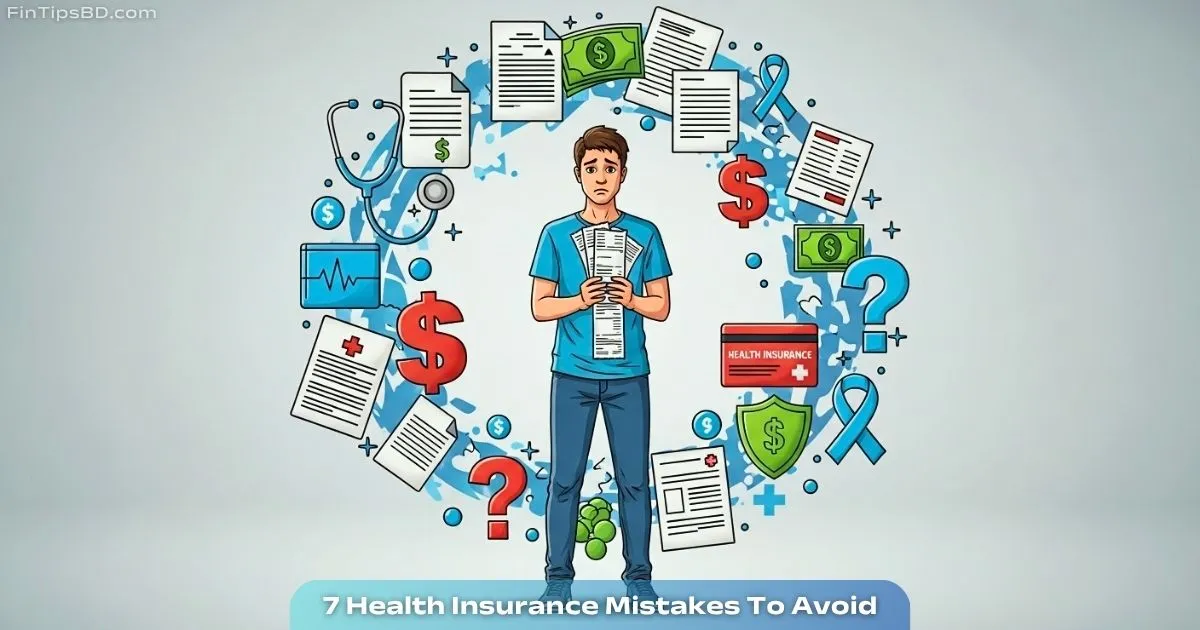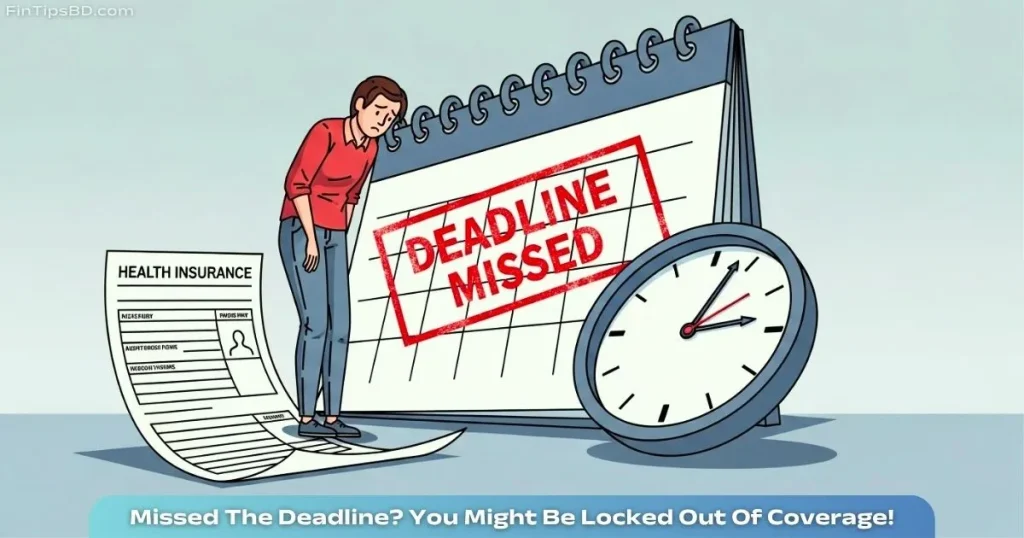Health Insurance Basics Exposed – 7 Mistakes Beginners Always Regret

When it comes to looking after both your health and your finances, getting familiar with the health insurance basics is absolutely essential. Too many newcomers jump into a plan without really grasping how everything works—only to end up spending more than they expected, or worse, discovering they aren’t properly covered when it truly counts. This thorough ACA insurance guide is designed to help you steer clear of those costly errors.
In this article, we’ll break down seven expensive mistakes that people new to health insurance often make. Understanding these slip-ups will help you feel much more confident when it’s time to select a plan that suits your lifestyle and budget. Our goal with this medical insurance advice is to equip you with the knowledge you need to make smart, informed choices.
Table Of Contents
1. Ignoring the Foundations of Health Insurance Basics
Before picking a health insurance plan, it’s vital to know some of the common terms involved. A lot of people wrongly assume they’re well-covered, only to be surprised by unexpected bills later—usually because they misunderstood a few important details. That’s where understanding healthcare terms becomes extremely important.
Here’s a quick breakdown of key ideas you need to grasp as part of the health insurance basics:
- Premium: This is the monthly payment you make to keep your insurance active. Think of it like a subscription fee that ensures you stay connected to your insurance network.
- Deductible: This refers to the amount you must pay on your own for medical services before your insurance starts pitching in. For instance, if your deductible is $1,000, you’ll need to cover the first $1,000 in medical bills out of your pocket.
- Co-payment (Copay): A flat fee you pay for specific services—such as doctor appointments, urgent care visits, or medications. Depending on your plan, this may apply before or after your deductible is met.
- Co-insurance: After reaching your deductible, this is the portion of the costs you’ll still be responsible for. If your co-insurance is 80/20, your provider pays 80%, and you cover the remaining 20% until you hit your out-of-pocket cap.
- Out-of-Pocket Maximum: This is the most you’ll have to pay in a year for covered services. Once you hit this limit, your insurance pays 100% of all remaining eligible medical costs for the rest of the policy term—regardless of the deductible or co-insurance.
Overlooking these health insurance basics can be a costly mistake. Take some time to learn these terms so you can confidently compare plans and avoid common beginner health insurance mistakes.
2. Picking a Plan Just Because It’s Cheap
It’s easy to be tempted by the lowest monthly cost, especially if you’re healthy, young, or trying to stretch your budget. But going for a plan just because of a low premium doesn’t always get you the best bang for your buck when it comes to choosing health insurance plans.
Why it’s a bad idea:
Budget-friendly plans often come with trade-offs—high deductibles, fewer in-network providers, and limited coverage for prescriptions or special care. If something unexpected happens, those small monthly savings can disappear fast, leaving you with sky-high medical bills. It’s a well-known trap that many health coverage tips warn against.
A smarter approach:
Look beyond just the monthly fee. Consider your full potential costs: premiums, deductibles, copays, co-insurance, and out-of-pocket limits. Try to find a middle ground between what you can comfortably afford each month and what you’d be responsible for if something serious comes up. Sometimes paying a bit more upfront can mean saving a lot more later. This broad perspective is part of truly learning how to choose health insurance wisely.
3. Forgetting to Check the Provider Network

A major and very common beginner health insurance mistake is not verifying whether your doctors and hospitals are in-network. Even if everything else about a plan looks great, missing this step can cause major headaches later.
How this mistake can hurt:
If you see an out-of-network provider, you might be stuck paying full price—or your insurance might only chip in a tiny amount. And in emergencies, you won’t always have time to check, which could lead to surprise bills that throw your finances off track.
The smart move:
Always look at the insurer’s provider list before signing up. If you already have a doctor or specialist you trust, make sure they’re included in the plan’s network. This small action can save you a lot of stress—and money—down the line by protecting your care continuity.
4. Overlooking the Benefits of Preventive Care
One of the most often missed points in health insurance basics is the importance of preventive services. Many people think insurance is only useful for emergencies or serious treatments, but that’s not the whole story—especially when it comes to preventive health coverage.
Why this matters:
Plans that follow the Affordable Care Act (ACA) usually cover preventive care at no extra charge. This means you can often get these services without paying any copay, coinsurance, or even meeting your deductible. Examples include:
- Annual health checkups
- Vaccinations (like flu shots and tetanus)
- Cancer screenings (such as mammograms and colonoscopies)
- Blood pressure and cholesterol tests
- Certain mental health screenings for depression and more
Skipping out on preventive care might seem like you’re saving time or money now, but it can lead to bigger, costlier health problems down the line.
What to do:
Make the most of your preventive benefits every year. Many of these services are fully covered and help spot health issues early before they grow into serious conditions that need expensive treatment.
5. Underestimating Your Total Out-of-Pocket Costs
A common mistake for beginners is focusing just on the monthly premium without thinking about how much they might pay for care over the whole year. This is where truly understanding health insurance explained can make a big difference.
What gets overlooked:
People often forget to factor in the cost of regular doctor visits, seeing specialists, mental health counseling, prescriptions, lab tests, or imaging scans. Some medicines or treatments may be in higher cost tiers or require prior approval, which adds surprise expenses.
How to avoid this:
Estimate your total health care spending based on past needs and any expected future treatments. If your insurer offers cost calculators, use them—they can give a good estimate of your yearly expenses based on what you might use. This is especially important if you have a chronic illness or take regular medication, since these can drive up your annual costs significantly. Keeping this in mind is a key health coverage tip.
6. Missing Important Enrollment Deadlines

Many people assume you can sign up or change your plan whenever you want, but that’s a dangerous misconception tied directly to the open enrollment deadline.
The risk:
If you miss the official enrollment window, you usually have to wait until the next year unless you qualify for a special enrollment period (SEP). SEPs happen after certain life changes like:
- Losing a job and your employer’s insurance
- Getting married or divorced
- Having or adopting a child
- Moving to a new area with different coverage
- Changes in income or household size
How to stay on top:
Mark important dates on your calendar. The ACA open enrollment period usually runs from November 1 to January 15 (dates can vary by region). Don’t wait until the last minute—technical problems or missing paperwork could delay your application and cause you to miss your chance.
7. Not Comparing Multiple Plans Thoroughly
It’s easy to just stick with the same health plan year after year or pick the first option that seems “good enough.” But this approach can backfire, especially as your health needs change or the insurance market shifts. This connects directly with choosing health insurance plans wisely.
Why this matters:
Insurance plans aren’t static. Every year, premiums, deductibles, copays, prescription coverage, provider networks, and out-of-pocket limits can change. The plan that was perfect for you last year might not be the best fit now.
What to do:
Make it a habit to compare at least two or three plans every year. Use government sites (like healthcare.gov in the U.S.) or trusted private tools to look at:
- Coverage details for the services you use most
- Which doctors and hospitals are in-network
- Estimated total yearly costs, including premiums and possible out-of-pocket spending
- Prescription drug coverage, checking if your meds are covered and how much you’ll pay
Even if you end up choosing the same plan again, this yearly review helps you make smarter healthcare and financial choices. This careful comparison is some of the best medical insurance advice you can follow.
Final Thoughts: Learn Before You Enroll
Mastering the health insurance basics isn’t just a good idea—it’s absolutely necessary. The risks are high: picking the wrong plan might leave you underinsured or facing thousands in unexpected bills. But when you understand how health insurance explained truly works, you can choose a policy that offers both protection and peace of mind.
Don’t wait until a medical emergency to realize you’re not prepared. Take your time to review your options, compare plans, and ask questions. The more knowledge you gain, the better your health coverage decisions will be, leading to a healthier life and a more secure wallet.
Keywords: health insurance explained, health coverage tips, beginner health insurance mistakes, choosing health insurance plans, understanding healthcare terms, medical insurance advice, ACA insurance guide, preventive health coverage, open enrollment deadline, how to choose health insurance
